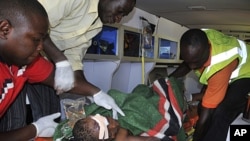A Nigerian scholar says the government is failing its fundamental duty to protect citizens following the Christmas day bombings that killed at least 35 people and injured many.
The radical Muslim sect Boko Haram has claimed responsibility for the attacks. It is the second consecutive year the group has targeted places of worship on Christmas day. The violence drew international condemnation.
Professor Kabiru Mato, chair of the political science department at the University of Abuja, is also calling for a revision of the government’s strategy to combat the security challenges, which he says is creating palpable fear among Nigerians.
“The reality on the ground now is that fear is all over the place. Everybody is feeling unsafe,” says Mato. “It goes further to propose that government is invariably failing in the discharge of its most fundamental responsibility, which is the protection of life and property.”
Mato’s comments follow the bomb attacks at a Catholic church near Abuja, an evangelical church in the central city of Jos and a church in the northeastern town of Gadaka. A fourth attack took place in the Yobe state capital of Damaturu, where a car bomb exploded near the secret police headquarters.
Mato says the government seems inept at combating the threat posed by what he calls “faceless characters.”
“The bombings clearly show that something fundamental is wrong. Whether the government is actually in control or that it is incapable of protecting lives of innocent citizens,” says Mato. “What we see happening by the minute is the deterioration of these social issues instead of them being decisively addressed as the government has continuously issued statements that it’s on top of issues [but not].”
President Goodluck Jonathan condemned the attacks and wants the perpetrators arrested. He was quoted as calling the bombings “an unwarranted affront on our collective safety and freedom,” and that “Nigerians must stand as one to condemn them.”
But critics say the administration has yet to effectively combat the security challenges the country faces.
Mato says there is growing doubt that Boko Haram is behind the violence.
“The turn of events now seems to suggest that there must be a more coordinated and sophisticated organization that is really carrying out this mayhem against the people of Nigeria,” says Mato. “I hope they are not just arresting people who are not involved in all these developments, leaving those who are perpetrating these serious crimes against humanity go free.”
The government has often deployed soldiers to the northern part of the country thought to be the haven for the Boko Haram. But, Mato says the latest round of violence shows the administration’s security strategy has been a “colossal failure.”
“The most important thing is for the government to settle down along with the security agencies to really appreciate the magnitude of the problem at hand. [They should then] devise a more strategic approach in understanding what is really the issue at stake and who are those responsible than merely making political statements every time the nation is thrown into such an unfortunate situation,” says Mato.











